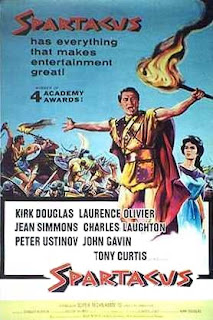Spartacus
 As 2010 rolls toward its conclusion, it's time to take my annual look at the films of fifty years in the past. I've already written about the films that arguably have the greatest legacy from 1960: Psycho and Breathless. Neither were nominated for Best Picture (although Alfred Hitchcock was nominated for Best Director). Another film from that year that has maintained a legacy is Spartacus, one of the last of the great sword-and-sandal epics.
As 2010 rolls toward its conclusion, it's time to take my annual look at the films of fifty years in the past. I've already written about the films that arguably have the greatest legacy from 1960: Psycho and Breathless. Neither were nominated for Best Picture (although Alfred Hitchcock was nominated for Best Director). Another film from that year that has maintained a legacy is Spartacus, one of the last of the great sword-and-sandal epics.It's hard for me to believe, but I had never seen Spartacus until yesterday. I suppose it's because it didn't get the television play that other films of its type got. It follows the conventions of that type of film, but is able to transcend them, making it smarter than the average spectacle.
Kirk Douglas stars as the historically-real Greek slave who led a rebellion against the Romans about a century before the birth of Christ. Douglas also produced the film, partly because he lost out on the lead for Ben-Hur and wanted to make an epic of his own. He did two things for film history that outweigh any qualities that are actually in the movie--he hired Stanley Kubrick to direct, and Dalton Trumbo to write the script.
Kubrick had made only two features before, but one of them was Paths of Glory, starring Douglas. Spartacus' original director was Anthony Mann, but Douglas fired him, sensing he was in over his head with the scope of the picture. Why he thought the far more inexperienced Kubrick was a better choice is a mystery, but it made Kubrick a major director, who would then go on to make half a dozen classic films. He distanced himself from Spartacus in later years, but his touch is evident.
Trumbo was a blacklisted screenwriter. He had worked throughout the McCarthy era, but using a pseudonym. Douglas insisted that he use his own name, thereby bringing the blacklist to a halt. For this alone Douglas deserves the respect and admiration of everyone in the entertainment community, and beyond. Certainly the film's most famous scene, when the captured slaves refuse to give up their leader ("I am Spartacus!") can be correlated with the McCarthy era, when those who some thought were lacking in courage "named names."
To quickly sum up the plot: Douglas is a slave who, after being insubordinate (he bites the ankle of a guard) is sold to a gladiator school, run by Peter Ustinov, where he is trained to fight for the amusement of the upper classes. He leads a revolt (after killing his overseer by drowning him in a pot of soup--a nice touch) and gathers slaves along the way to the sea, hoping to leave Italy and return to his native land. He falls in love with a slave girl (Jean Simmons), who escapes from Ustinov, and bonds with another slave, played by Tony Curtis.
The Roman authorities, led by Crassus (Laurence Olivier), try to stop him, ostensibly so he can seize power, while others, led by Senator Gracchus (Charles Laughton) hope to see them escape, out of his love for the Republic and a certain sense of decency.
The film is big, really big, with a cast of thousands and a panoramic sweep. Many scenes have the actors in extremely long shots, set against vistas (it was shot in Spain). There are many parts that are corny, to be sure. I have a hard time believing Kubrick really wanted to include a scene of a boy being squirted in the face with goat's milk, for example. Where the film rises above this kitschy stuff is the interplay between Olivier and Laughton, both making chess moves to try to beat the other one. Both of these actors turn in magnificent performances, but it was Ustinov, drolly effete and a marvelous source of comic relief, who won the Oscar for Best Supporting Actor.
Spartacus also won Oscars for costumes, art direction, and cinematography (although Russell Metty, who won the latter award, was relieved by Kubrick early on, and it was Kubrick who did most of the lighting). The film fell into disrepair through the years, and was restored in the early 90s. One scene, which was originally cut, features Olivier being bathed by Curtis, and talking about how he likes both "snails and oysters"--pretty homoerotic stuff for 1960. The restoration team wanted to pu the scene back, but the soundtrack was lost. Curtis redubbed his lines, but Olivier was dead. Coming to the rescue was Anthony Hopkins, who did a wicked Olivier impersonation. If you listen closely you can tell it's Hopkins, but to those who don't know wouldn't notice anything amiss.
Kubrick thought that Spartacus, as a character, had no flaws, and thus the film wasn't as interesting as it could have been. He's right, but this didn't occur to me while watching it. Most of these spectaculars were Biblical in nature, but Spartacus wasn't, although they did their best to make it so, having the film end with Simmons weeping beneath the crucified Spartacus. This was a bit much, and seemed to shoehorn Christianity into an otherwise pagan film. Still, I liked this film a great deal, and if it is too bombastic it is restrained compared to those of its kind.


Comments
Post a Comment